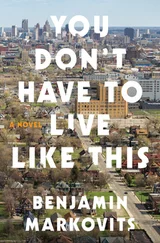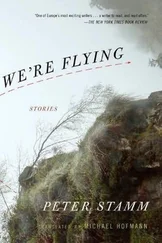Andreas put the last page of the letter on the table with the others. He was glad there were no hard feelings from Nadia. It had never occurred to him that she was exploiting him. That idea fascinated him. He knew people could ask for anything from him. He would do whatever was required, and if he noticed he was being taken advantage of, then at the most he would be angry with himself. Everything would be much easier if you could see yourself as a victim, he thought, a victim of your childhood, of fate, of the people you had grown up among, and finally too, as a victim of illness. But in order to feel himself a victim, he had to believe in the possibility of another, better life. Andreas believed in nothing but chance. He loved the curious coincidences and repetitions that life threw up, against all logic. He loved the surprising patterns that came about in the sky, or on a body of water or in the shade of a tree, the continual tiny adjustments in the same overall context. Nadia called it nihilism; his own word for it was modesty.
After breakfast, he called Fabienne. She asked if he wanted to speak to Manuel, who was down in the basement.
“Did you tell him you saw me?”
There was quiet for a moment, then Fabienne said, no, she hadn’t, she wasn’t sure if he would have wanted that.
“Can we see each other?”
“Manuel and Dominik are building a hot-air balloon. I don’t know if they’re going out today or not. Maybe if the wind drops, they will.”
“Can you get away?”
“I’ll have to be back here at twelve by the latest.”
She thought about it. Then she said they could meet by the camper. Would he remember the way? She said she’d be waiting for him in the parking lot in half an hour.
As Andreas drove down the narrow gravel track, he saw Fabienne’s white camper in the empty parking lot. He was a bit late, but he hadn’t been here for twenty years, and had taken a wrong turning and gotten briefly lost. He parked next to Fabienne, and for a moment they looked at each other, as if they had happened to stop together at a traffic light or in a department store parking garage. Andreas got out, and walked around the car. He could hear music softly playing. Fabienne leaned forward, and the music stopped. She climbed out and kissed him on both cheeks. She was wearing jeans and a yellow slicker.
“You’re prepared for anything, aren’t you,” he said. As for himself, he had his swimming trunks with him.
“It’s supposed to rain again in the afternoon,” said Fabienne.
Even though she had already told him on the phone, he asked her again how much time she had. She said she would have to go back at half past eleven at the latest. She asked him what he had done in the past few days. She unlocked the gate, and locked it again after them. If she ever forgot to lock it, she said, people would be in there in no time, lighting fires and leaving their trash lying around.
They stood in a big meadow with old trees. To either side of them, the land was bordered by wild hedges, and on the lake side by a wide growth of rushes. A wooden boardwalk led through the rushes to the water.
They strolled over the meadow, as though aimlessly, just to stretch their legs. Fabienne bent to pick up some toys in the grass, and put them away in the camper.
“Do you think the season’s over for this year?” asked Andreas.
“We often come here in the autumn too,” said Fabienne. “Even in winter. We have a little rowboat. Manuel and Dominik go fishing in it.”
The sun shone in between the clouds, and everything glistened in its light. There was an almost transparent haze in the trees and the reeds. Andreas and Fabienne walked along the boardwalk through the rushes. At the end of it, they sat down on the wooden planking, and looked out across the lake. The air was very clear, and the German shore seemed almost within reach.
“Look,” said Fabienne, pointing to a crested grebe, diving not far from where they were. They waited in silence until it emerged on the surface again. Andreas lay down on his belly and dipped his hand in the water.
“The water’s warmer than the air,” he said. “Do you fancy a swim?”
“Why not,” said Fabienne. “Seeing as we’re here.”
She got changed in the camper, he outside in the meadow. She appeared in the doorway and took his bundle of clothes from him, and put it in the camper.
He walked across the meadow after her. She was walking faster than a moment ago, perhaps she was cold, or she sensed his eyes on her. She was wearing a one-piece bathing suit and had tied a scarf around her waist. Andreas tried to remember what she had looked like when he had first met her. Ever since he had seen her again, his old images of her were rubbed out. He had told her she hadn’t changed, but she must have in all that time.
The water was colder than he’d expected. The chill took his breath away. They swam a little way out into the lake, and then parallel to the shore. Andreas had overtaken Fabienne, and was swimming on ahead in short strokes, so as not to pull away from her. After a few hundred yards, they turned and swam back.
Andreas climbed out of the water. Fabienne held on to the metal ladder, and did some leg kicks. She looked up at him and smiled. He paced up and down the pier, shaking his arms, and once or twice jumping up and down. Then Fabienne too came out. They wrapped themselves in their towels, and sat side by side on the pier, so close that their shoulders touched. The sun was gone. Andreas was gibbering with cold.
“Aren’t you cold?” he asked.
“A little bit.”
For a while they looked out across the lake in silence, then Andreas laid his hand on Fabienne’s shoulder. Suddenly he felt very young and unsure of himself. He cleared his throat.
“Yes?” said Fabienne, and Andreas asked her if she remembered how he had kissed her twenty years before. She said it hadn’t been so cold that day. He said he had loved her very much back then.
He looked at her from the side, her profile, her slender neck and shoulders, on which a few drops of water glistened, the hair, darker at the ends. She looked out at the lake, and said in a slightly throaty voice that she hadn’t been aware of anything.
“I wrote you a letter. But I never mailed it.”
“You’re freezing,” said Fabienne. “Come on, let’s get dressed.”
They ran along the boardwalk, and through the damp grass to the camper. Andreas got out of breath and started coughing. He followed Fabienne into the camper. She passed him his things. He was still hesitating while Fabienne peeled off her suit and hung it on a clothesline that already had a boy’s trunks on it. For a moment she stood naked in front of him. She smiled, half uncertain, half provocative, then she turned her back to him and got dressed.
They left the place. Andreas looked at his watch, it wasn’t ten yet. In silence they walked along a path, away from the parking lot, past a couple of fenced-in estates, and a large meadow. The path was winding back toward the lake, but the water couldn’t be seen for the reeds. After a few hundred yards, the path divided, and one half led into the reed bed. Fabienne went ahead, Andreas followed. The path ended in a wooden observation platform. They climbed up the ladder-like steps. On top was a sign that said the platform had been built by the birdwatchers’ association, “for bird-lovers everywhere, who have not lost the capacity for wonder.”
Fabienne leaned over the handrail, and looked out at the lake. She asked if Andreas was still feeling cold. No, he said, it was better now. He was standing just behind her. He grasped her shoulders with both hands. She lowered her head, and leaned forward a little. He held her hips, and pushed his hands under her waterproof jacket. She stood up a little straighter, otherwise she barely moved. He kissed her neck, stroked her breasts. She turned around. When he tried to kiss her mouth, she turned her face away. He tried to shove his hand in her jeans. She broke away, and undid her belt and top button.
Читать дальше












